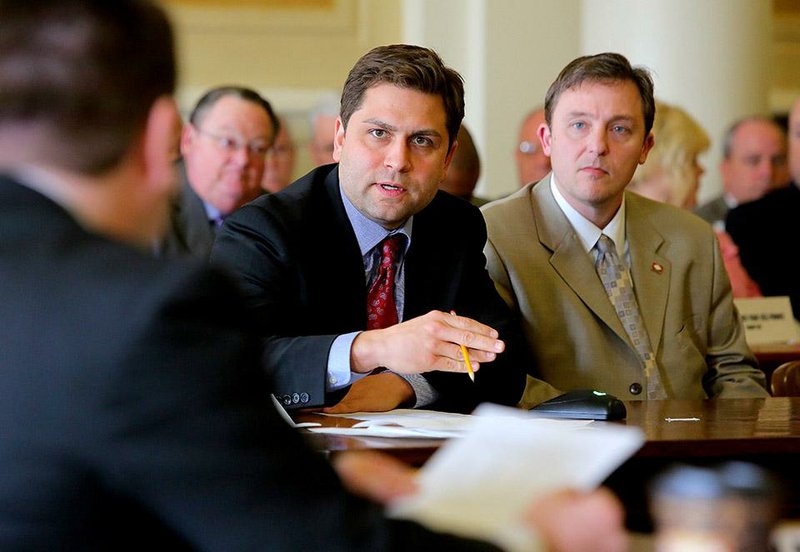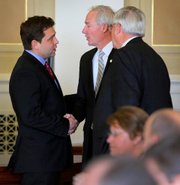A bill cutting state income-tax rates for Arkansans with taxable incomes of between $21,000 and $75,000 sailed Wednesday through an Arkansas Senate committee.
The legislation, Senate Bill 6, includes Gov. Asa Hutchinson's proposed income-tax plan and also repeals capital- gains tax cuts enacted in 2013.
In a voice vote, without dissent, the Senate Revenue and Taxation Committee recommended that the Senate approve the package, which is sponsored by Senate President Pro Tempore Jonathan Dismang, R-Searcy.
But first the committee approved an amendment, proposed by Sen. Bill Sample, R-Hot Springs, to eliminate the reductions in capital-gains taxes.
Sample said a group of senators came up with the idea, which would free up about $21 million a year to help pay for Hutchinson's middle-income tax cut. He said Hutchinson didn't ask him to propose the amendment.
The governor's spokesman, J.R. Davis -- when asked if Hutchinson had suggested the amendment -- described it as "a joint effort."
Two months ago, then-Gov. Mike Beebe recommended that lawmakers delay implementation of three tax cuts projected to reduce revenue by $29.4 million in fiscal 2016 and $24.5 million in fiscal 2017. In addition to lowering income taxes on capital gains, they would reduce the sales tax on natural gas and electricity used by manufacturers, and increase the standard personal income tax deduction.
Hutchinson said he supports Sample's amendment to repeal the capital gains tax cuts.
"This amendment is also consistent with my desire to focus on middle-class Arkansans, as a start to our effort to have a competitive income tax rate," Hutchinson said in a written statement. "The net effect of this tax reduction package will return roughly a billion dollars to the middle-class taxpayers over a 10 year period."
SB6 would reduce state general tax revenue by $12.8 million in fiscal 2016, starting July 1, and $80.6 million in fiscal 2017, the state Department of Finance and Administration estimated.
Without Sample's amendment, SB6 would have reduced state general revenue by $33.7 million in fiscal 2016 and $102.1 million in fiscal 2017, the finance department estimated.
If SB6 becomes law, Arkansans with taxable incomes between $21,000 and $75,000 would see the tax rate drop from 6 percent to 5 percent on income between $21,000 and $35,099, starting next year.
The tax rate on income between $35,100 and $75,000 would fall from 7 percent to 6 percent.
About 597,000 Arkansans earning $21,000 to $75,000 will benefit from the reduced income tax rates, said John Theis, an assistant revenue commissioner for the state.
A taxpayer with taxable income of $75,000 will save $540, while a taxpayer with $50,000 of taxable income will save $290; someone with taxable income of $35,000 will save $140, he said.
The average net taxable income reported in Arkansas in 2013 was $35,200, so the tax savings under SB6 for someone with that level of taxable income would be $120, he said.
SB6 also delays a 0.1 percentage point income tax rate cut for most Arkansans until next year. Only those with taxable incomes of less than $21,000 will get that tax cut, as scheduled, this year.
Starting next year, those with taxable incomes above $75,000 will pay tax on that portion of their incomes above $35,100 at the rate of 6.9 percent rather than 7 percent. The remainder of their incomes will be taxed at the rates in effect for tax year 2014, according to the finance department.
SB6 repeals Act 1488 of 2013 that increased the capital gains exclusion from the state income tax from 30 percent to 50 percent, starting this tax year, and provided an income-tax exemption for that part of a capital gain received by a taxpayer in excess of $10 million starting last tax year. The law would be repealed retroactive to Jan. 1 of this year.
Act 1488 was sponsored by then-House Speaker Davy Carter, R-Cabot, who could not be reached for comment.
The number of taxpayers who would benefit from the increased capital gains tax exclusion cut varies widely each year, but has fluctuated between 100,000 and 150,000 in recent years, Theis said.
During the past few years only 10-12 taxpayers would benefit from the $10 million capital-gains exemption, he said.
Hutchinson met Wednesday with members of the Senate and House Revenue and Taxation Committees and provided information about his proposed budget for fiscal 2016 and how he would finance his proposed income-tax cut.
Sen. Larry Teague, D-Nashville, said "we did see some numbers [from Hutchinson on Tuesday] that made me comfortable" voting for SB6.
Sen. Bruce Maloch, D-Magnolia, said he prefers SB6 to the 0.1 percentage point income tax cut approved in 2013 because "it is targeted to the middle class."
While he said he would prefer that the committee wait until later in the session so it can "deal with some issues," he will vote for SB6 based on the budget information provided by Hutchinson.
SB6 will require a three-fourths vote in the state House of Representatives and Senate because, among other things, it eliminates parts of the reduced income tax rate cuts enacted by Act 1459 of 2013, which cut income-tax rates by 0.1 percentage point, according to the Department of Finance and Administration.
Dismang said he expects to ask the Senate to approve SB6 today.
Twenty-nine of the Senate's other 33 members are co-sponsors on his bill.
Senate Democratic leader Keith Ingram of West Memphis, and Sens. Joyce Elliott, D-Little Rock, David Johnson, D-Little Rock, and Bryan King, R-Green Forest, said they haven't decided how they will vote on SB6.
"It doesn't mean I am against a tax break," said Elliott. "It just means that I don't understand how the tax break fits into the entirety of the budget. It just seems premature to me to consider a vote before we know how it is going to impact the entire budget.
"I would even love to know what it means for the private option. The whole thing to me matters," Elliott said.
This morning at the University of Arkansas for Medical Sciences in Little Rock, Hutchinson is to give a speech on health-care policy, including whether he supports reauthorization of the private option that uses federal Medicaid dollars to purchase private health insurance for low-income Arkansans.
House Speaker Jeremy Gillam, R-Judsonia, said he'll be able to see how SB6 fits in with the overall state budget on Tuesday when Hutchinson releases his proposed fiscal 2016 budget.
Asked whether SB6's repeal of capital gains tax cuts would spark opposition, Gillam said it's too early to tell.
"We'll see kind of where we are at overnight and the next few days," he said. "I think you'll still have a lot of broad support for the concept [of the middle-class income tax cut]. I don't necessarily see that waning. But we'll see if there are any individual members that have any concern over this and we'll give them a chance to work through the process.
"I still think that you got very broad support for the bill," Gillam said.


